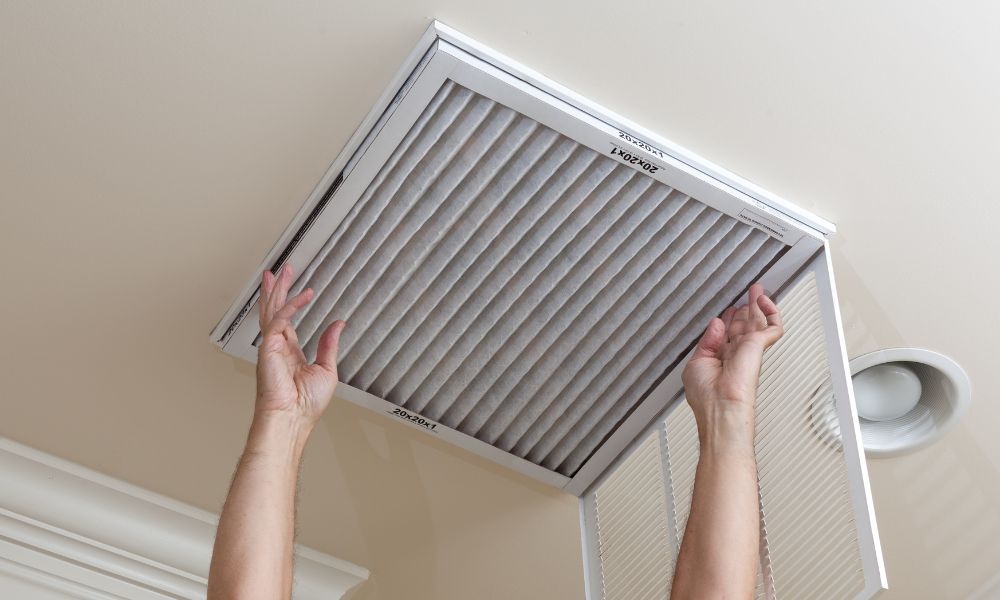It’s the first muggy heatwave of the year, and your AC’s wheezing like it just ran a marathon.
HVAC breakdowns aren’t just inconvenient – they’re expensive, uncomfortable, and usually show up at exactly the wrong time. Here in Wilmington, where humidity, salt air, and pollen gang up on your system year-round, staying ahead of problems is half the battle.
In this guide, we’ll walk you through a seasonal HVAC checklist with clear tips on what you can tackle yourself (no fancy tools required) and when it’s smarter to call in the pros. Whether you’re gearing up for a scorcher or just want to make it through hurricane season without surprise AC drama, we’ve got you covered.
Don’t forget to grab the printable checklist at the end – or book a quick tune-up with your local HVAC pros.
Why does regular HVAC maintenance matter?
HVAC maintenance isn’t exactly the most thrilling item on your to-do list – we get it. But skipping it can come back to haunt you the moment your system decides to call it quits on a 95-degree July afternoon.
A little upkeep goes a long way. Regular maintenance helps your system run efficiently, keeps energy bills lower, and spares you from those “why is it 87 degrees inside?” moments. It also catches small issues before they turn into big, expensive ones.
And Wilmington doesn’t do HVAC systems any favors. Between the humidity, salt air, and a pollen season that turns everything greenish-yellow, your system’s working overtime whether you realize it or not.

Benefits of regular HVAC maintenance
- Lower energy bills (your wallet will thank you)
- Fewer surprise breakdowns (no more AC drama at 2am)
- A longer-lasting system (because replacing it isn’t cheap)
- Better indoor air quality (less dust, pollen, and mystery funk)
- A shot at keeping your warranty valid (yes, they do check)
DIY or Bust: HVAC tasks you can (and should) do yourself
You don’t need to be a certified technician or own a voltmeter to keep your HVAC system running smoothly. A few simple habits can go a long way toward preventing breakdowns, improving air quality, and keeping those energy bills in check.
Replace your air filters
This one’s easy – and makes a BIG difference. Dirty filters make your system work harder, burn more energy, and spread dust and allergens around your home. (No, thanks!) If you have pets or live near a construction site, check monthly

Dust your vents and registers
Grab your vacuum (yep, the one gathering dust) and give those vents a quick once-over. Cleaner vents = better airflow and less sneezing.
Clear debris from the outdoor unit
Your outdoor unit isn’t a squirrel condo – clear off the leaves, pine needles, or general mystery fluff at least once a month, otherwise quarterly is probably fine. Trim any overgrown plants and gently hose off dirt buildup to keep air moving freely.
Test your thermostat settings (seasonally)
Before the season flips, switch your thermostat to heating or cooling mode and make sure it’s behaving. If it uses batteries, swap those out too – your future self will thank you when that cold snap hits.
Flush the condensate drain
If you’re up for it, pour a cup of white vinegar into the condensate drain line to keep it clear and fend off weird smells. Not into DIY plumbing? Don’t worry – this is something your HVAC tech can handle during a tune-up.
Check insulation on refrigerant lines
Take a quick look at the foam tubing covering the refrigerant lines running to your outdoor unit. If it’s cracked, missing, or looking sad, it may be time to replace it – or have a tech do it for you.
Pro tip: Schedule a reminder in your phone or calendar for filter changes
When to call the pros (and what they actually do)
DIY maintenance is great, and really important – filters, vents, debris, vinegar? Gold stars all around!
But even the very best-kept system needs a pro’s eyes now and then. HVAC systems are complex, and seasonal tune-ups aren’t just a marketing gimmick – they’re how you catch worn-out parts, weird electrical issues, or refrigerant leaks before your system gives up the ghost mid-heatwave.
Here’s what a professional technician typically checks during a seasonal tune-up:
- Inspect and clean evaporator and condenser coils
- Check refrigerant levels and pressure
- Test and tighten electrical connections
- Lubricate moving parts to reduce friction and wear
- Calibrate the thermostat for accurate temperature control
- Check for duct leaks or blockages
- Clean the condensate drain line (if needed)
- Look for worn-out belts, motors, or anything sketchy
Humidity + salt air = corrosion’s dream team. Even if your system seems fine, the coastal climate slowly eats away at metal components. A trained tech can spot early signs of wear that you probably wouldn’t catch until your unit stops working.
Not sure when to schedule?
If it’s been more than a year, go ahead and book one. Most people do a spring and/or fall tune-up to prep for the season. Bonus: if you book early, you’re more likely to get your preferred time slot and avoid last-minute panic scheduling.
Seasonal HVAC reminders for Wilmington Homeowners
Wilmington doesn’t exactly do chill transitions. One week it’s 50 degrees, the next you’re sticking to your car seat. And that unpredictability is rough on your HVAC system.
You’ll notice a few tasks show up in both the spring and fall checklists – things like changing filters or clearing out debris. That’s on purpose. Some habits are just that important and repeating them with the seasons helps your system keep up.
Spring checklist: pre-cooling season
Get your system ready before the first big heat wave hits. Spring is the perfect time to freshen things up and spot any winter-related wear.
- Replace air filters (ideally every 1-3 months)
- Test cooling mode on your thermostat
- Clear leaves/debris from outdoor unit (monthly is recommended)
- Flush the condensate drain line (check the vinegar tip above)
- Dust or vacuum around indoor vents and returns
- Schedule a spring tune-up (clean coils, check refrigerant, inspect fan motor)
- Bonus: check windows and doors for air leaks
Mid-summer reminder
If your AC has been working hard and you start noticing puddles near your indoor unit or a musty smell, your condensate drain line might be clogged. A vinegar flush can help but it may be time to call in a pro for proper cleanout.
Fall checklist: pre-heating season
Even though winters in Wilmington are mild, you’ll still want a system that’s ready when the temps drop – especially overnight.
- Replace air filters (every 1-3 months is best)
- Switch the thermostat to heat, and make sure it responds
- Clear outdoor unit of leaves, pine needles, or other debris (monthly is recommended)
- Check thermostat schedule (especially if you’ve got a “smart” one)
- Dust or vacuum around indoor vents and returns
- Schedule a fall tune-up (inspect burners, check for CO leaks if gas-powered)
Pro tip: Add calendar reminders for March and September so your HVAC system gets some love before the seasonal rush.
Stay ahead of HVAC surprises
The best time to think about HVAC maintenance is before something goes wrong. Whether you’re prepping for a hot Wilmington summer or just want to stay cozy through winter, a few simple steps now can save you stress later.
→ Download our free seasonal HVAC checklist and hang it on your fridge
OR
→ Book a tune-up with our friendly local team and let us take care of it for you.
Either way, you’ll be ahead of the game – and your HVAC system will thank you.













